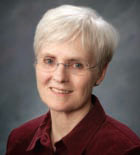As a seasoned estate planner, Leigh McCarthy stresses the importance of helping clients think about the possibilities for being philanthropic in their wills and plans. In a conversation at her Bangor office, McCarthy expanded on the importance of talking with clients about charitable giving.
 MaineCF: How do you view your role when discussing philanthropic interests with clients?
MaineCF: How do you view your role when discussing philanthropic interests with clients?
Leigh McCarthy: My most important role is to raise the issue. There are tax advantages for making charitable contributions, but I also want to find out what my client’s goals are and how they feel about charitable contributions. We can then tailor their estate planning documents to what they would really like to accomplish.
MaineCF: Can you share an example of a planned charitable gift that helped minimize tax consequences for a client?
McCarthy: I worked with an elderly widow who had significant assets but not a lot to give away. She wanted to support The Nature Conservancy, but she was worried about making gifts and then not having enough to live on later. We set up an inter vivos charitable remainder trust to which she transferred highly appreciated stocks. She has an annuity for life from the trust, recognized an income tax deduction at the time of the gift to the trust and has reduced her potential estate taxes. And the trust remainder will go to The Nature Conservancy at her death. The charitable remainder trust structure worked very nicely to meet her needs.
MaineCF: Do you recommend resources to your clients to help with philanthropic planning?
McCarthy: It depends on what they tell me they want to do. If they’re interested in supporting cancer research, for example, then we try to direct them toward opportunities to do that. Most often people who are that focused come to me with an idea already in mind.
We frequently do tell people about the Maine Community Foundation because we know you and because we know you’re trustworthy and have so many options available for charitable giving. I am always pleased when clients ask about charitable giving because, although there are many bona fide and wonderful charities, unfortunately there also are many advertised “opportunities” for charitable giving that do not operate with the integrity of the Maine Community Foundation.
MaineCF: If a client is weighing the differences between establishing a private foundation or setting up a donor-advised fund, what are some issues that may arise?
McCarthy: We always talk to clients about the ongoing costs, headaches and responsibilities of managing a private foundation. Usually, when we’re talking about a private foundation, it is often associated with a family business that has done quite well. In that context, clients generally want to maintain con-trol themselves, though questions may come up related to how a private foundation might affect relationships in the family, who is going to have decisionmaking authority, or how that authority will be passed to future generations. Often clients have never heard of a donor-advised fund and don’t under stand what such funds can offer.
MaineCF: Do you have any stories of a positive outcome from a client’s charitable plans after his or her death?
McCarthy: I had a client who was widowed and quite ill and not wealthy. Having struggled herself, she wanted to leave a bequest to the Eastern Agency on Aging to provide funds for elderly people who need transport for medical appointments or for home services, but who have worked all their lives and have a few assets and don’t qualify for Medicaid.
We wrote a testamentary bequest to the Eastern Agency on Aging into her Will. Although we notified the Agency at the time the Will was executed that it was a designated beneficiary, the Agency was surprised at the amount of the bequest. It wasn’t millions, but to the Agency, and to those it is intended to help, the bequest was substantial, and it will provide meaningful ongoing help for many, just as my client hoped it would.
MaineCF: What advice would you give your peers about how to approach a discussion of charitable giving with clients?
McCarthy: I guess the only tip I would share is that often clients don’t know what’s possible. They may not know how to ask questions or what questions to ask about charitable giving. The more an estate planning attorney can encourage clients to talk about their dreams and what sort of legacy they’d like to leave, the more it is possible to offer information and find a way to help clients accomplish something they really want to do–and in some cases obtain a tax benefit, too.
Leigh Stephens McCarthy is a senior attorney and partner at the Bangor law firm of Rudman and Winchell. Her practice focuses on estate planning, estate and trust administration, and business and family immigration. McCarthy earned her J.D. from the University of Maine School of Law, summa cum laude, where she served as editor in chief of the Maine Law Review. She serves by appointment of the Governor as a member of the Maine Board of Bar Examiners.





